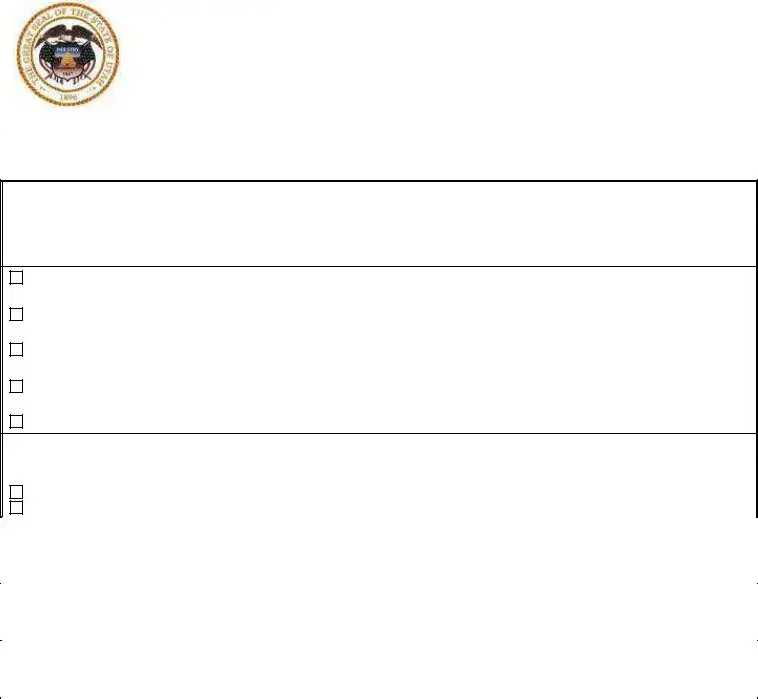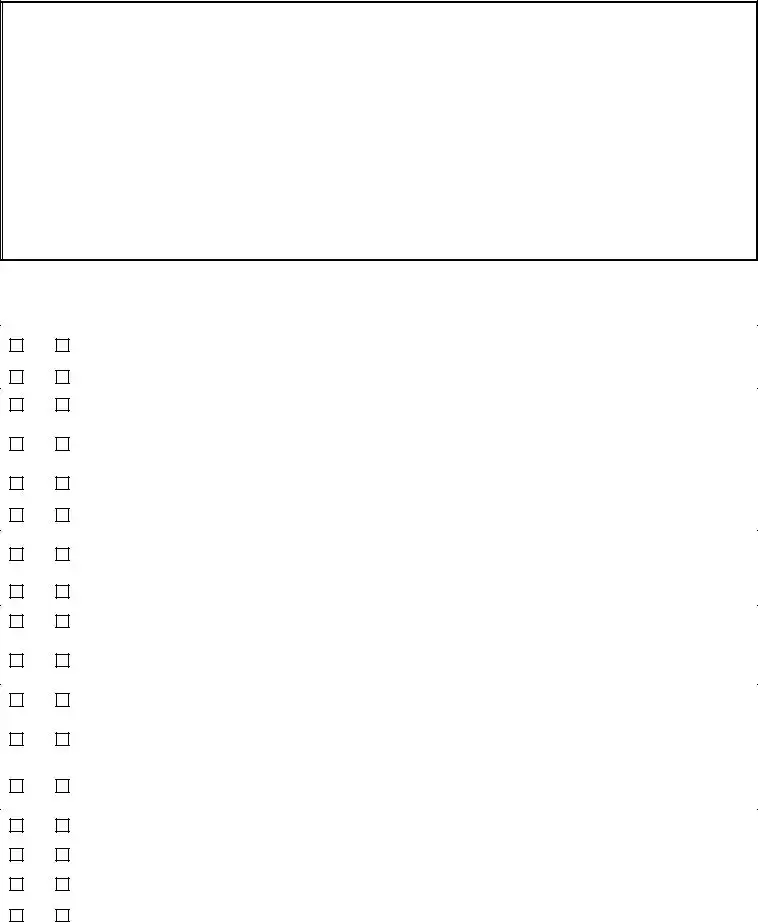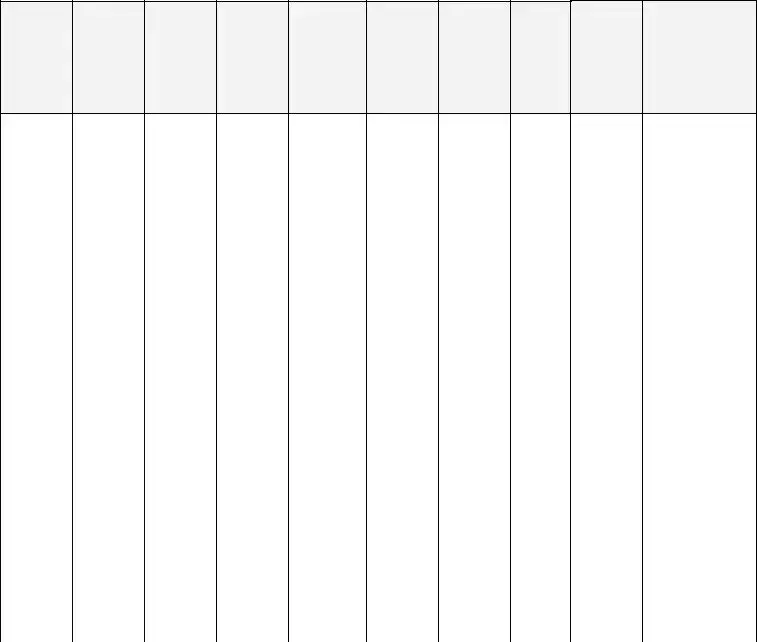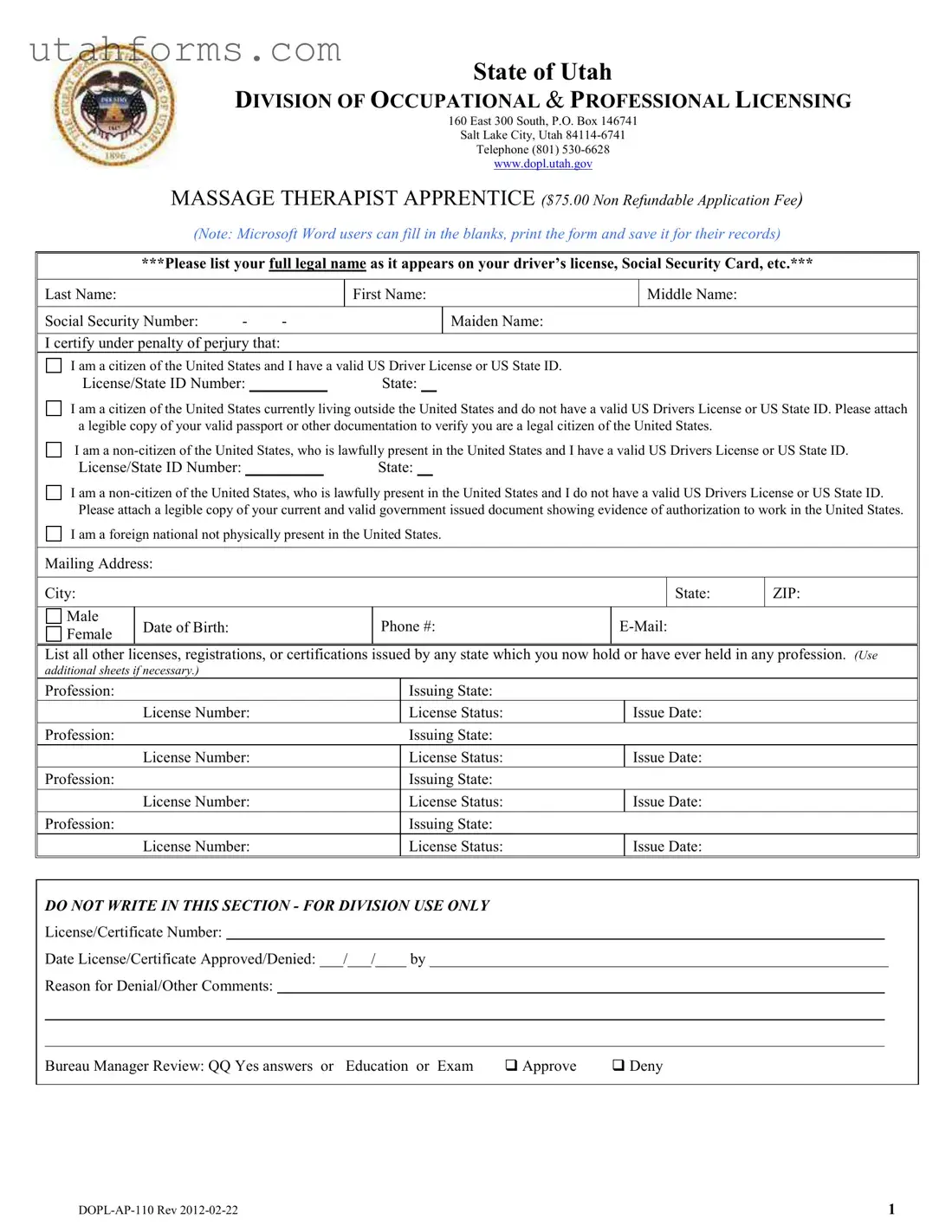Fill Out Your Utah Dopl Ap 110 Form
Navigating the intricacies of professional licensure in Utah involves dealing with various forms, one of which is the DOPL AP 110 form. This document is a crucial piece of the puzzle for professionals across a range of industries looking to either apply for or renew their licenses. Its comprehensive nature requires detailed personal information, professional history, and other specifics pertinent to the licensure process regulated by the Division of Occupational and Professional Licensing (DOPL) in Utah. Designed to streamline the application and renewal processes, this form plays a pivotal role in ensuring that standards of practice are met, thereby protecting the public's health, safety, and welfare. More than just a formality, the completion and submission of this document demand accuracy and thoroughness, as it directly influences the applicant's eligibility for obtaining or maintaining their professional credentials. As such, understanding the DOPL AP 110 form’s requirements, implications, and its place within the broader framework of professional licensure in Utah is essential for all current and aspiring licensees.
Preview - Utah Dopl Ap 110 Form

!"#$%
&'()%*+%
/0&12&3&2!
!"#
!"##!$%&'!(''$(')
345 |
6"7345 |
||
|
|
|
|
8"87"#34975 |
|
|
|
|
|
|
|
"8(=2349755
"8(=2349755
|
|
|
|
|
|
|
|
|
|
|
|
|
|
|
|
|
|
|||
|
|
|
|
|
|
|
|
|
|
|
|
|
|
|
|
|
|
|
||
|
!"#5 |
|
|
|
|
|
|
|
|
|
|
|
|
|
5 |
>25 |
|
|
||
|
|
|
|
|
|
|
|
|
|
|
|
|
|
|
|
|
|
|
|
|
|
|
/ |
:"75 |
|
(?5 |
|
|
/"5 |
|
|
|
|
||||||||
|
|
64 |
|
|
|
|
|
|
|
|||||||||||
|
|
|
|
|
|
|
|
|
|
|
|
|
|
|
|
|
|
|
|
|
|
|
|
||||||||||||||||||
|
% |
|
|
|
|
|
|
|
|
|
|
|
|
|
|
|
|
|
||
|
7:"(5 |
|
|
|
|
|
|
2"(.5 |
|
|
|
|
|
|
|
|
|
|||
|
|
"8(34975 |
|
|
"8(5 |
|
|
25 |
|
|
|
|
||||||||
|
7:"(5 |
|
|
|
|
|
|
2"(.5 |
|
|
|
|
|
|
|
|
|
|||
|
|
"8(34975 |
|
|
"8(5 |
|
|
25 |
|
|
|
|
||||||||
|
7:"(5 |
|
|
|
|
|
|
2"(.5 |
|
|
|
|
|
|
|
|
|
|||
|
|
"8(34975 |
|
|
"8(5 |
|
|
25 |
|
|
|
|
||||||||
|
7:"(5 |
|
|
|
|
|
|
2"(.5 |
|
|
|
|
|
|
|
|
|
|||
|
|
"8(34975 |
|
|
"8(5 |
|
|
25 |
|
|
|
|
||||||||
|
|
|
|
|
|
|
|
|
|
|
|
|
|
|
|
|
|
|
|
|
|
|
|
|
|
|
|
|
|
|
|
|
|
|
|
|
|
|
|
|
|
|
|
|
|
|
|
|
|
|
|
|
|
|
|
|
|
|
|
|
|
|
|
|
|
|
|
|
|
|
|
|
|||||||||||
|
"8(=!7":"834975 |
|
||||||||||||||||||
|
|
|
|
|
|
|||||||||||||||
|
||||||||||||||||||||
|
(:7("=7!44(5 |
|
||||||||||||||||||
|
|
|
||||||||||||||||||
|
|
|||||||||||||||||||
|
|
|
|
|
|
|||||||||||||||
|
|
|
|
|
|
|
|
|
|
|
|
|
|
|
|
|
|
|
|
|
|
|
|
|
|
|
|
|
|
|
|
|
|
|
|
|
|
|
|
|
|

!$+,
287":#9:4#
27"<'7("(""(7.("<"(8.7(4(.(8"4'#77:7(87(#7(
345@@@@@@@@@@@@@@@@@@@@@@@@@@@@@@@@@@@@@@@@@@@".(75@@@@@@@@@@@@@@@@@@@@@@@@@@@@@@@@@@@@5@@@@@@@@@
|
|
|
|
|
$ (!$!/0!)!%!0!1!2) |
|
|
)&%#"%'("%"%* |
|
|
|
B |
3 |
|
|
|
|
|
|
|
B |
3 |
|
|
|
|
B |
3 |
|
|
|
|
|
|
|
B |
3 |
|
|
|
|
B |
3 |
+ |
|
|
.(8#E |
B |
3 |
|
|
|
|
|
|
|
B |
3 |
|
|
|
|
B |
3 |
% |
|
|
|
B |
3 |
F |
|
|
|
|
|
|
B |
3 |
|
|
|
|
B |
3 |
|
|
|
7"4974('7.74E |
|
|
|
B |
3 |
|
|
|
|
|
|
|
B |
3 |
|
|
|
|
B |
3 |
|
|
|
(:784(.(8#E |
B |
3 |
+ |
|
|
|
B |
3 |
|
|
|
|
B |
3 |
|
|
|
7 |
* |

|
|
% |
B |
3 |
#7:#7'"(78"(7'9"8:#7,:798:(#8"784(87 |
|
|
|
B |
3 |
F |
|
|
|
B |
3 |
|
|
|
|
B |
3 |
|
|
|
'#"84(79E |
|
|
|
B |
3 |
|
|
|
|
B |
3 |
|
|
|
|
|
|
|
B |
3 |
|
|
|
|
B |
3 |
+ |
|
|
|
B |
3 |
|
|
|
|
B |
3 |
|
|
|
|
|
!/$45!1%0!(!'/##'!'"#!"!/#'''"!'!$ |
|
|
|
|
|
|
''"!'''$+!$.'!%'!(#!1!'(!$:$$!!')."''# |
|
|
##'1#'#;<(''$;<(!$#1!:#'#;<) |
|
|
|
|
|
!11!!'$0$1%("1"$'"!!!'$"#' |
|
|
$#"!!$:'!$'! !"!!! %1) |
|
|
|
|
|
%"=#! $'"!'$%$!'$1'$ !$1>$ ($!!$$''"! |
|
|
)=#! "!$"1!?"!$!'!!$?!1=#! "!1'"#$ |
|
|
!$'"!"!$"'$) |
|
|
|
|
|
4.5!/$!!'"!/!1 !$'!@/%("0$$!$'"!! |
|
|
!"!1"$!'!) |
|
|
3 |

+A+.
B!$CA
|
|
|
|
|
|
|
|
|
|
|
|
|
|||
|
|
|
|
||||
|
|
|
|
|
|
|
|
|
|
|
|
|
|||
|
|
|
|
||||
|
|
|
|
|
|
|
|
|
|
|
|
|
|
|
|
|
|
|
|
|
|||
|
|
|
|
||||
|
|
|
|
|
|
|
|
|
|
|
|
|
|||
|
|
|
|
||||
|
|
|
|
|
|
|
7."(:4.9"4(E |
|
|
|
|
|
|
|
|
|
|
|
|
|
|
|
|
|
|
|
|
+ |
|||
|
|
|
|
||||
|
|
|
|
|
|
|
|
|
|
|
|
|
|
|
|
|
|
|
|
|
|
|
|
|
|
|
|
|
|||
|
|
|
|
||||
|
|
|
|
|
|
|
4. |
|
|
|
|
|
|
|
|
|
|
|
|
|
|
|
|
|
|
|
|
4.7'"4#'7:74'74.7.,:784:48"(":8"(." |
|||
|
|
|
|
||||
|
|
|
|
|
|
|
798(( |
|
|
|
|
|
|
|
|
|
|
|
|
|
|
% |
|
|
|
|
|
|
|||
|
|
|
|
|
|
|
'78"8"(.4."($ |
|
|
|
|
F |
|||
|
|
|
|
||||
|
|
|
|
|
|
|
|
|
|
|
|
|
|||
|
|
|
|
||||
|
|
|
|
|
|
|
|
|
|
|
|
|
|
|
|
|
|
|
|
|
|||
|
|
|
|
||||
|
|
|
|
|
|
|
|
|
|
|
|
|
|
|
|
|
|
|
|
|
|
|
|
|
|
|
|
|
|||
|
|
|
|
||||
|
|
|
|
|
|
|
|
|
|
|
|
2"("8:74.7'"(.."(8""#,"8"(,"4.7'"=8"( |
|||
|
|
|
|
||||
|
|
|
|
|
|
|
7"("'" |
|
|
|
|
|
|
|
|
|
|
|
|
|
|
|
|
|
|
|
|
|
|||
|
|
|
|
||||
|
|
|
|
|
|
|
|
|
|
|
|
+ |
|||
|
|
|
|
||||
|
|
|
|
|
|
|
|
|
|
|
|
|
|
|
|
|
|
|
|
|
|
|
|
|
|
|
|
|
|||
|
|
|
|
||||
|
|
|
|
|
|
|
844("8"(E |
|
|
|
|
|
|
|
|
|
|
|
|
|
|||
|
|
|
|
||||
|
|
|
|
|
|
|
|
|
|
|
|
|
|
|
|
|
|
|
|
|
|
|
|
|
|
|
|
% |
|||
|
|
|
|
||||
|
|
|
|
|
|
|
|
|
|
|
|
|
|
|
|
|
|
|
|
F |
|||
|
|
|
|
||||
|
|
|
|
|
|
|
|
|
|
|
|
|
|
|
|
|
|
|
|
|
|||
|
|
|
|
||||
|
|
|
|
|
|
|
|
|
|
|
|
|
|
|
|
6 |

BDC
345 |
|
|
6"7345 |
|
|
||||||
|
|
|
|
|
|
|
|
|
|
|
|
|
|
|
8"87"#34975 |
|
|||||||
|
|
|
|
|
|
|
|
|
|
|
|
|
|
|
|
|
|
|
|
|
|
||
|
|
|
|
|
|
|
|
|
|
|
|
!"#5 |
|
|
|
|
|
|
|
|
5 |
>25 |
|
|
|
|
|
|
|
|
|
|
|
|
|
".(7:''"8(5 |
|
|
|
|
|
|
:".(75 |
||||
|
|
|
|
|
|
|
|
|
|
|
|
|
|
|
|
|
|
|
|
|
|
|
|
*E?A?.+E |
|
|
|
|
|
|
|||||
|
|
|
|
|
|
|
|
|
|||
345 |
|
6"7345 |
|
||||||||
|
|
|
|
|
|
|
|
|
|
||
14!"#5 |
|
|
|
|
|
|
|
|
5 |
>25 |
|
|
|
|
|
|
|
|
|
|
|
||
"(!"#5 |
|
|
|
|
|
|
|
|
5 |
>25 |
|
"8(34975 |
|
|
|
|
|||||||
|
|
|
|
|
|
|
|||||
"'7"7I,7 |
|
||||||||||
"?!E |
|
|
|
|
|
|
|
|
|
|
|
|
|
|
|
|
|
|
|
|
|
||
"(!"#5 |
|
|
|
|
|
|
|
|
5 |
>25 |
|
&5 |
7.17J7 |
|
|||||||||
"?!E |
|
|
|
|
|
|
|
|
|
|
|
|
|
|
|
|
|
|
|
|
|
||
"(!"#5 |
|
|
|
|
|
|
|
|
5 |
>25 |
|
&5 |
7.17J7 |
|
|||||||||
"?!E |
|
|
|
|
|
|
|
|
|
|
|
|
|
|
|
|
|
|
|
|
|
||
"(!"#5 |
|
|
|
|
|
|
|
|
5 |
>25 |
|
&5 |
7.17J7 |
|
|||||||||
"?!E |
|
|
|
|
|
|
|
|
|
|
|
|
|
|
|
|
|
|
|
|
|
||
"(!"#5 |
|
|
|
|
|
|
|
|
5 |
>25 |
|
&5 |
7.17J7 |
|
|||||||||
&17J7
".(7:'7"75 |
:".(75 |
|
|
7 |
)6&J223&230*
8 |

A+ABD+
&",7
|
'7"7345 |
(5 |
||||||||||||||||
|
|
|
|
|
|
|
|
|||||||||||
|
|
|
|
|
|
|
||||||||||||
|
''7("8345 |
(5 |
||||||||||||||||
|
|
|
|
|
|
|
|
|||||||||||
|
|
|
|
|
|
|
|
|||||||||||
|
|
|
|
|
'"0"!1 |
|
|
|
||
|
||||||||||
&9 |
/. |
/. |
/. |
(4# |
.# |
7:"( |
(""( |
!44( |
||
&7# |
!"( |
2(78"( |
&8("C |
#".# |
$("7 |
|
||||
|
7"8 |
78"( |
|
|||||||
|
|
|
+"8 |
K"(".# |
"( |
2(8! |
|
|||
|
|
|
|
78"8 |
|
|||||
|
|
|
|
/. |
|
|||||
|
|
|
|
|
7 |
|
|
|
|
|
|
, |
/ |
/ |
|||||||
|
|
|
|
|
|
||||||||||
|
|
|
|
|
|
|
|
|
|
|
|
|
|
|
|
|
|
|
|
|
|
||||||||||
|
|
|
|
|
|
|
|
|
|
|
|
|
|
|
|
|
|
|
|
|
|
||||||||||
|
|
|
|
|
|
|
|
|
|
|
|
|
|
|
|
|
|
|
|
|
|
||||||||||
|
|
|
|
|
|
|
|
|
|
|
|
|
|
|
|
|
|
|
|
|
|
||||||||||
|
|
|
|
|
|
|
|
|
|
|
|
|
|
|
|
|
|
|
|
|
|
||||||||||
|
|
|
|
|
|
|
|
|
|
|
|
|
|
|
|
|
|
|
|
|
|
||||||||||
|
|
|
|
|
|
|
|
|
|
|
|
|
|
|
|
|
|
|
|
|
|
||||||||||
|
|
|
|
|
|
|
|
|
|
|
|
|
|
|
|
|
|
|
|
|
|
||||||||||
|
|
|
|
|
|
|
|
|
|
|
|
|
|
|
|
|
|
|
|
|
|
||||||||||
|
|
|
|
|
|
|
|
|
|
|
|
|
|
|
|
|
|
|
|
|
|
||||||||||
|
|
|
|
|
|
|
|
|
|
|
|
|
|
|
|
|
|
|
|
|
|
||||||||||
|
|
|
|
|
|
|
|
|
|
|
|
|
|
|
|
|
|
|
|
|
|
||||||||||
|
|
|
|
|
|
|
|
|
|
|
|
|
|
|
|
|
|
|
|
|
|
||||||||||
|
|
|
|
|
|
|
|
|
|
|
|
|
|
|
|
|
|
|
|
|
|
||||||||||
|
|
|
|
|
|
|
|
|
|
|
|
|
|
|
|
|
|
|
|
|
|
||||||||||
|
|
|
|
|
|
|
|
|
|
|
|
|
|
|
|
|
|
|
|
|
|
||||||||||
|
|
|
|
|
|
|
|
|
|
|
|
|
|
|
|
|
|
|
|
|
|
||||||||||
|
|
|
|
|
|
|
|
|
|
|
|
|
|
|
|
|
|
|
|
|
|
||||||||||
|
|
|
|||||||||||||
9 |

.?BD+
#%:!'1"1''!#%# )=#!/#!"'0"!)
!7&" |
!787"'"( |
!7"( |
&9 |
17= |
||
|
|
|
!4'(8" |
)'7"(* |
|
|
|
|
|
|
|
|
|
|
|
|
|
|
|
|
|
|
|
|
|
|
|
|
|
|
|
|
|
|
|
|
|
|
|
|
|
|
|
|
|
|
|
|
|
|
|
|
|
|
|
|
|
|
|
|
|
|
|
|
|
|
|
|
|
|
|
|
|
|
|
|
|
|
|
|
|
|
|
|
|
|
|
|
|
|
|
|
|
|
|
|
|
|
|
|
|
|
|
|
|
|
|
|
|
|
|
|
|
|
|
|
|
|
|
|
|
|
|
|
|
|
|
|
|
|
|
|
|
|
|
|
|
|
|
|
|
|
|
|
|
|
|
|
|
|
|
|
|
|
|
|
|
|
|
|
|
|
|
|
|
|
|
|
|
|
|
|
|
|
|
|
|
|
|
|
|
|
|
|
|
|
|
|
F |

|
|
/0&12&3&2! |
|
|
|
|
'"!'2)"")"% |
|
|
||
|
|
|
|
|
|
|
|
|
|
||
|
||
|
|
|
|
|
|
|
||
|
|
|
|
|
|
(74&(!.(7&(
!
! #!'$!'"#!$:##$/1>'$($! '!#'
=#$'!#'('!1!'!'! #!! &';
!"# $<(FEHH)")6EHH#)")(A!$ $(='#$)!(!
'!'! #!'!##'!)'! %!"!$#'0$)
?A;?<AE !8 ,"!2:7'7"8"(.:"77"8
J "((#D(''"(4( (
J9"5,,,98".
(5)%*F++F
G |
+
'(
A"###'!E
|
|
|
"""(:88'"(7:"("8("(. |
|
?))A |
|
|
|
|
|
!"#$% |
|
|
|
"""(:88'"(7:"("8("(. |
|
?=#A |
6799# |
|
|
!! |
|
|
|
|
|
!"#$&%+ |
|
|
||
#!"1E |
)%*+% |
||
|
|
|
)%*++O&:7"($ |
|
|
|
|
|
|
|
|
H |
File Specifications
| Fact | Description |
|---|---|
| Form Purpose | The Utah DOPL AP 110 form is designed for professional licensing and registration within the state of Utah. |
| Governing Body | Administered by the Utah Division of Professional Licensing (DOPL), which oversees the licensing of various professions. |
| Governing Law | The form and its procedures are governed by Utah state law, specifically regulations pertaining to professional licensing. |
| Accessibility | The form is accessible through the Utah DOPL’s official website and is available for download in a printable format. |
How to Write Utah Dopl Ap 110
Filling out the Utah DOPL AP 110 form might seem daunting at first glance, but it's quite straightforward when you break down the steps. This document is essential for professionals in Utah seeking licensure or certification in their field. Completing it accurately is the first step in showcasing your qualifications and expertise. Below are clear instructions to guide you through each section of the form, ensuring that your submission is thorough and correct.
- Start by reading through the entire form to understand what information is required.
- Enter your full legal name, including any suffixes, in the section marked for applicant information. Ensure the spelling matches that on your legal documents.
- Fill in your social security number or individual taxpayer identification number in the designated space. This information is kept confidential but is required for identity verification purposes.
- Provide your date of birth using the format MM/DD/YYYY to avoid any confusion with day and month placement.
- Indicate your gender by selecting the appropriate option provided on the form.
- List your mailing address, including street, city, state, and ZIP code, to ensure you receive any correspondence related to your application.
- Include a primary phone number where you can be easily reached, as well as an alternate number if available.
- Provide your email address. Double-check to ensure it is accurate, as this will likely be a primary mode of communication.
- If applicable, fill in your work information, including your employer's name and contact details.
- Detail your education and training relevant to the field you are applying for. Include the name of the institution, the type of degree, and the date conferred.
- Complete the section on professional experience, specifying the employer, the position held, and the dates of employment. This section is crucial for establishing your qualifications in your chosen field.
- If required, list any professional licenses or certifications you currently hold or have held in the past, including the state of issuance and license numbers.
- Answer all questions related to your professional conduct and history. Be honest and provide explanations where necessary.
- Review the form to ensure all information is complete and accurate. Make any necessary corrections.
- Sign and date the form in the designated areas, affirming the truthfulness and accuracy of the information provided.
- If there is a fee associated with your application, ensure that you include the correct amount and payment method as instructed on the form.
- Double-check the submission instructions, including the mailing address or online portal details, before sending your application to the Utah Division of Occupational and Professional Licensing (DOPL).
After you've submitted your form, it's time to wait for a response. The DOPL will review your application, which may include verifying your credentials and conducting a background check if necessary. This process can take some time, so be patient. Meanwhile, consider preparing for any exams or additional requirements needed for your licensure. Keep a copy of your application for your records, and don't hesitate to reach out to the DOPL if you have questions about your application status or next steps.
Frequently Asked Questions
Frequently asked questions about the Utah DOPL AP 110 form:
-
What is the Utah DOPL AP 110 form used for?
The Utah DOPL AP 110 form is a crucial document utilized by the Utah Division of Occupational and Professional Licensing (DOPL). Its primary use is for licensure and regulation of various professions and occupations within the state. This can include anything from healthcare providers to construction workers, ensuring that professionals meet the required standards for their respective fields.
-
How can I obtain the Utah DOPL AP 110 form?
The form can be accessed through the official website of the Utah Division of Occupational and Professional Licensing. It is available for download in a PDF format, allowing for easy printing and completion. Additionally, physical copies may be available at the DOPL office for those who prefer or require a hard copy.
-
Who needs to fill out this form?
This form is intended for individuals seeking licensure or certification in occupations regulated by the Utah Division of Occupational and Professional Licensing. It is also used by current licensees who need to renew or update their license information. Ensuring your information is accurate and current is essential for maintaining professional licensure in Utah.
-
Are there any fees associated with the Utah DOPL AP 110 form?
Yes, there are fees associated with the submission of the Utah DOPL AP 110 form, which can vary depending on the specific occupation and the type of licensure or certification being applied for or renewed. It's important to review the current fee schedule provided by DOPL, which can be found on their website, to ascertain the exact fees applicable to your situation.
-
What documents are required to accompany the Utah DOPL AP 110 form?
The required accompanying documents can vary significantly based on the specific licensure or certification being applied for. Generally, these can include, but are not limited to, proof of professional education, work experience documentation, exam scores, and identity verification. It is vital to consult the specific requirements for your profession, outlined by the Utah Division of Occupational and Professional Licensing, to ensure you submit all necessary documentation.
Common mistakes
Filling out the Utah DOPL AP 110 form can be a complex process where errors can easily occur if not given the proper attention. Here are the most common mistakes people make:
- Omitting required information: Applicants frequently leave sections incomplete. Every field must be filled in to avoid processing delays.
- Incorrect personal information: Providing inaccurate details such as an incorrect address, name spelling, or social security number, can lead to significant complications.
- Failure to sign and date: Not signing or dating the form invalidates the application immediately. It is a crucial step that is easily overlooked.
- Not using the current form version: The Utah Division of Professional Licensing frequently updates their forms. Submitting an outdated version can result in rejection.
- Misunderstanding the fee structure: Incorrect fees or payment methods can lead to administrative holds. It is important to verify the current fee requirements.
- Providing incomplete documentation: Often, applications are submitted without the necessary supplementary documents, which are crucial for the processing of the application.
It is crucial for individuals to read the instructions carefully and ensure that all sections of the form are completed accurately and thoroughly. Double-checking personal details for accuracy before submission and making sure all needed documents are attached can save time and prevent delays. Applicants should always use the most current version of the form and adhere to the specified fee structure to facilitate a smoother application process. Avoiding these common mistakes can significantly increase the chances of a successful application.
To further assist applicants, providing clear, step-by-step guidance on properly completing the form can be invaluable. This includes emphasizing the importance of specific sections that might cause confusion and clarifying any common misconceptions. Guidance can be provided through various formats, including informational brochures, online tutorials, or one-on-one assistance through customer service. By taking these proactive measures, applicants are more likely to submit a complete and correct application on their first attempt.
Documents used along the form
When working with the Utah DOPL AP 110 form, it is common to encounter several other forms and documents that play critical roles in the processing and completion of applications. Understanding these documents ensures a seamless application process. Below is a list of other forms and documents often used in conjunction with the Utah DOPL AP 110 form, along with brief descriptions of each.
- Criminal History Background Check Authorization: This form authorizes a background check, a standard requirement for most professional licenses.
- Professional Education Transcript Request: Used to request and verify academic records and qualifications from educational institutions.
- Verification of Licensure: This document is used when an applicant needs to verify a license held in another state or country.
- Continuing Education Compliance Form: For professions requiring continuing education, this form is used to prove completion of required coursework.
- Professional Reference Form: Used to gather professional references as part of the assessment of an applicant’s qualifications and character.
- Practice Hours Verification Form: Necessary for professions requiring a certain number of practice hours for licensure; this form verifies those hours.
- Supervised Experience Documentation: Similar to the Practice Hours Verification Form, this is used in fields where supervised practice is a prerequisite for licensure.
- License Renewal Application: This form is necessary for existing license holders to renew their professional licenses according to the renewal cycle.
- Specialty Certification Forms: Some professions may require additional certifications; these forms are used to apply for or verify those certifications.
Each of these documents serves a specific purpose in ensuring that applications are thorough, compliant, and ready for review. Whether an applicant is pursuing new licensure, looking to maintain a current license, or seeking verification of credentials, these forms play crucial roles in the professional licensure process in Utah.
Similar forms
The Utah DOPL AP 110 form shares similarities with various other professional licensing forms from different states, each designed to collect personal, educational, and professional information from applicants seeking licensure in specific fields. For instance, the California Board of Professional Engineers, Land Surveyors, and Geologists Application for Licensure requires similar details regarding an applicant's educational background and professional experience to ensure they meet the state's requirements for licensure in these professions.
Similarly, the New York State Education Department's Application for Professional Licensure parallels the Utah DOPL AP 110 form by asking for comprehensive information on the applicant's education, work experience, and any certifications or licenses held in other jurisdictions. This form is a critical step in the process to ensure that professionals meet the high standards expected in New York, safeguarding the public by ensuring competent practice.
The Texas Board of Professional Engineers Application for Licensure is another analogous document, emphasizing the importance of verifying an applicant's educational qualifications and work experience in the field of engineering. The focus on detailed professional history and references helps maintain high standards of practice within the engineering community in Texas.
The Florida Department of Business and Professional Regulation's Licensure Application serves a similar purpose for a wide range of professions, from cosmetology to engineering, ensuring that practitioners in the state are qualified. Like the Utah form, it collects detailed information about the applicant's qualifications, experience, and legal background to protect public welfare.
The Oregon Board of Examiners for Engineering and Land Surveying Application for Registration also shares similarities, particularly in its requirement for detailed evidence of educational attainment and practical experience. This thorough vetting process is crucial for maintaining the integrity and professionalism of the engineering and land surveying fields in Oregon.
In the healthcare sector, the Illinois Department of Financial & Professional Regulation’s Application for Professional Licensure for nurses requires proof of education, passage of relevant examinations, and background checks, akin to the requirements in the Utah DOPL AP 110 form, reflecting the universal need across states to ensure healthcare practitioners meet stringent criteria for knowledge, skill, and ethics.
For legal professionals, the New York State Board of Law Examiners’ Application for Admission to the Bar probes deeply into an applicant's legal education, character, and fitness to practice law, similar to how the Utah form assesses candidates for professional licensure in various fields, ensuring only qualified individuals can serve the public.
The National Council of Architectural Registration Boards (NCARB) Record for certification closely aligns with the Utah form in its extensive collection of details regarding an architect’s education, internship, examination results, and reciprocal licensure. This information forms the basis of certifying architects for practice across state lines.
The North Carolina Board of Licensed Clinical Mental Health Counselors Licensure Application is yet another example, emphasizing the importance of detailed educational history, supervised clinical experience, and examination scores. This ensures that mental health counselors are well-equipped to provide essential services to the public.
Lastly, the Colorado Department of Regulatory Agencies Division of Professions and Occupations License Application mirrors the Utah DOPL AP 110 form by requiring detailed personal information, educational background, examination scores, and a history of disciplinary actions, if any, ensuring the applicant meets Colorado's standards for professional practice in their chosen field.
Dos and Don'ts
Filling out the Utah DOPL AP 110 form is a crucial step for professionals seeking licensure or certification in their respective fields within the state of Utah. To ensure accuracy and avoid any potential delays in the application process, consider the following guidelines:
Do:- Read all instructions provided with the form carefully before filling it out.
- Use black ink or type when completing the form to ensure legibility.
- Provide accurate and complete information in every section to avoid processing delays.
- Include all required documentation, such as proof of education, training, or work experience, as specified in the form instructions.
- Sign and date the form where required to certify the accuracy of the information provided.
- Double-check for any misspellings, especially of names and addresses.
- Contact the DOPL directly if you have any questions or need clarification on how to complete the form.
- Keep a copy of the completed form and any supporting documents for your records.
- Submit the form and any required fees according to the instructions provided, ensuring you meet any deadlines.
- Use the most current form version by downloading it directly from the DOPL website to avoid using outdated information.
- Leave any sections blank — if a section does not apply, mark it as 'N/A' (not applicable).
- Rush through the form, as errors can cause delays or rejection of your application.
- Use pencil, as it can smudge or be erased, leading to incomplete information.
- Forget to include your contact information for potential follow-up by the DOPL.
- Submit the form without checking that all required sections are completed and accompanying documents are attached.
- Ignore instructions about notarizing certain parts of the application, if applicable.
- Assume the process is complete once the form is submitted; follow up to ensure it was received and is being processed.
- Omit payment of any fees required, as this will delay processing your application.
- Use outdated or incorrect form versions, which can lead to processing errors.
- Underestimate the importance of reading all accompanying materials and instructions provided by the DOPL for your specific licensure or certification process.
Adhering to these guidelines can streamline the application process and avoid unnecessary complications, helping you to achieve professional licensure or certification in a timely manner.
Misconceptions
There are some common misconceptions about the Utah DOPL AP 110 form. Understanding these misconceptions is crucial for professionals looking to navigate the licensure process smoothly. Here are five widely held but incorrect beliefs:
- It's only for medical professionals. Many assume the AP 110 form is exclusively for doctors or nurses. However, it's also required for a range of professionals applying for licensure in Utah in various fields, not just healthcare.
- Completion guarantees licensure. Filling out the AP 110 form thoroughly is essential, but it doesn't guarantee approval. The licensing board also considers other factors like education, experience, and background checks.
- It's a one-time submission. While it might seem like a one-and-done deal, circumstances requiring updates or amendments to your submitted information might necessitate re-submission or additional paperwork.
- The process is quick. Many applicants expect a swift turnaround after submitting their AP 110 form. Reality often differs, with processing times varying based on the volume of applications and the specifics of each case.
- Electronic submissions are preferable. While electronic submissions are increasingly common and encouraged for their convenience and eco-friendliness, some situations might require or benefit from traditional paper submissions, depending on the specific requirements of the Utah Division of Professional Licensing at the time of application.
Understanding these misconceptions about the Utah DOPL AP 110 form can significantly demystify the application process, leading to more accurate expectations and better preparation among applicants.
Key takeaways
Understanding the Utah DOPL AP 110 form is crucial for applicants looking to navigate the licensure process effectively. Here are ten key takeaways to help applicants accurately complete and utilize the form:
- The Utah DOPL AP 110 form is integral to applying for various professional licenses regulated by the Division of Occupational and Professional Licensing (DOPL) in Utah.
- Applicants should ensure all information provided on the form is accurate and complete to avoid any delays in the processing of their application.
- It's important to carefully review the specific requirements for the license type being applied for, as the DOPL AP 110 form covers multiple professions.
- The form requires personal information, including your full legal name, address, and contact details, to effectively communicate with applicants throughout the licensure process.
- Professional experience, education, and any other qualifications relevant to the license type must be clearly detailed in the application.
- Applicants must disclose any criminal convictions and professional disciplinary actions, as this information is vital for the review process.
- The form may require supplemental documentation, such as proof of education or professional references, to be submitted along with the application.
- Applicants should be aware of the application fee associated with their license type and ensure that payment is submitted with the completed form.
- The processing time for applications can vary, so applicants are encouraged to submit their forms well in advance of when they require licensure.
- Once submitted, applicants can check the status of their application through the DOPL website or by contacting the department directly for updates.
Overall, the Utah DOPL AP 110 form is a critical step in pursuing professional licensure within the state. By closely following the instructions and providing a thorough, accurate application, candidates can contribute to a smoother review process and enhance their chances of successful licensure.
Common PDF Templates
Survivorship Affidavit Utah - It’s the go-to document for scheduling a hearing about your vehicle's impoundment with Utah authorities.
Dws Forms - Support for first-time users in navigating the wage reporting system of Utah’s Department of Workforce Services.
Utah Dopl Ap - Applicants unable to obtain electronic fingerprints must include two blue fingerprint cards with their application for the criminal background checks.
